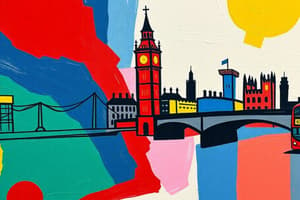Podcast
Questions and Answers
Где находится Лондон?
Где находится Лондон?
- Юго-Восточная Англия (correct)
- Северная Англия
- Юго-Западная Англия
- Северо-Восточная Англия
Какой период был началом роста Лондона?
Какой период был началом роста Лондона?
- В 10 веке
- В 5 веке до н. э.
- В 1 веке н. э. (correct)
- В 15 веке
Что разделяет Лондон на различные зоны?
Что разделяет Лондон на различные зоны?
- Горы
- Равнины
- Река Темза (correct)
- Леса
Какое значение имеет Лондон как глобальный торговый центр?
Какое значение имеет Лондон как глобальный торговый центр?
Какой период характеризуется возросшим количеством людей и расширением территории Лондона?
Какой период характеризуется возросшим количеством людей и расширением территории Лондона?
Какие города были конкурентами Лондона к середине 18 века?
Какие города были конкурентами Лондона к середине 18 века?
Какая отрасль особенно сильна в Лондоне?
Какая отрасль особенно сильна в Лондоне?
Какая доля жителей Лондона родилась за границей?
Какая доля жителей Лондона родилась за границей?
Какой известный парк упоминается в тексте как место для отдыха в Лондоне?
Какой известный парк упоминается в тексте как место для отдыха в Лондоне?
Какая транспортная система широко известна под прозвищем «Труба»?
Какая транспортная система широко известна под прозвищем «Труба»?
Какая достопримечательность упоминается в тексте как привлекающая туристов со всего мира?
Какая достопримечательность упоминается в тексте как привлекающая туристов со всего мира?
Какой аэропорт описывается как один из самых загруженных международных аэропортов в мире?
Какой аэропорт описывается как один из самых загруженных международных аэропортов в мире?
Flashcards are hidden until you start studying
Study Notes
London
Overview
London, located in England, is the capital city of the United Kingdom, boasting a rich history that spans nearly two millennia. With a sprawling area of approximately 607 square miles (1,572 square km), London is also the country's biggest metropolis and holds significant roles as England's economic, transportation, and cultural hub.
Location and Growth
London is situated in southeastern England, positioned close to the River Thames, which conveniently divides the city into distinctive zones. The metropolitan area is surrounded by a green belt, and its physical limits roughly correspond to the administrative and statistical boundaries separating the metropolitan county of Greater London from neighboring counties such as Kent, Surrey, Berkshire, Buckinghamshire, Hertfordshire, and Essex.
The city has seen significant growth throughout history, starting with its Roman origins in AD 43 when it was established under the name Londinium. Over time, the city expanded to encompass a broader area and increase in population, experiencing periods of abandonment and resurgence. By the 18th century, London had grown into one of the world's leading cities, rivaling other major urban centers like New York City, Tokyo, and Hong Kong.
Economic Influence
London's economic clout is evident through its status as a global trading hub. The city is home to numerous multinational corporations, including Sky Group, BBC, British Petroleum, Vodophone, Barclays, HSBC Holdings, and many more. Its financial services sector is particularly robust, dealing with currencies, equities, commodities, and insurance on a global scale. Additionally, London serves as an administrative center, hosting key national institutions that shape the country's political landscape.
Cultural Significance
Culturally, London is a melting pot, attracting immigrants from various countries over centuries. This diverse population has led to the creation of vibrant neighborhoods reflecting different ethnicities, which contribute to the city's rich cultural fabric. Today, nearly one-third of London's residents originate from overseas, making it one of the most multiethnic cities globally.
Despite its bustling urban environment, London also offers green spaces like Hyde Park and Regent's Park, providing residents and visitors alike with opportunities to enjoy nature amidst the city's busy streets. Additionally, the city boasts iconic landmarks such as Buckingham Palace and Tower Bridge, attracting tourists from around the world.
Transportation Hub
London's transportation network is extensive, consisting of trains, buses, taxis, and the famous London Underground, commonly known as the Tube. This efficient system connects different parts of the city, making it easier for locals and visitors to navigate. Furthermore, London Heathrow Airport serves as one of the busiest international airports globally, linking the city to numerous destinations worldwide.
Challenges and Opportunities
Like any large city, London faces challenges such as urban sprawl, gentrification, and income inequality. However, these issues also present opportunities for innovation and growth. The city's ongoing evolution reflects its resilience and adaptability to changing times. As the capital city of one of the most influential countries in history, London continues to shape global trends while preserving its unique character and charm.
Studying That Suits You
Use AI to generate personalized quizzes and flashcards to suit your learning preferences.




